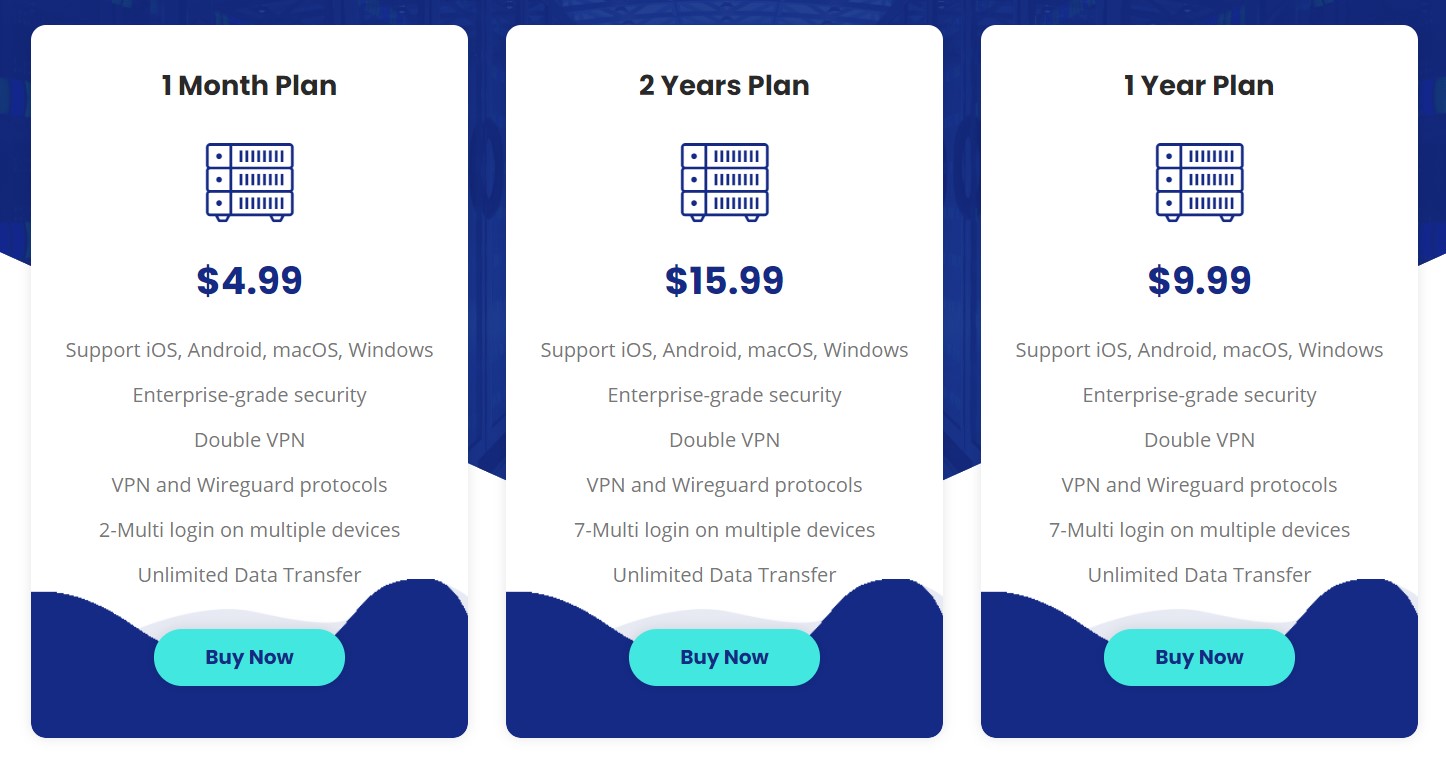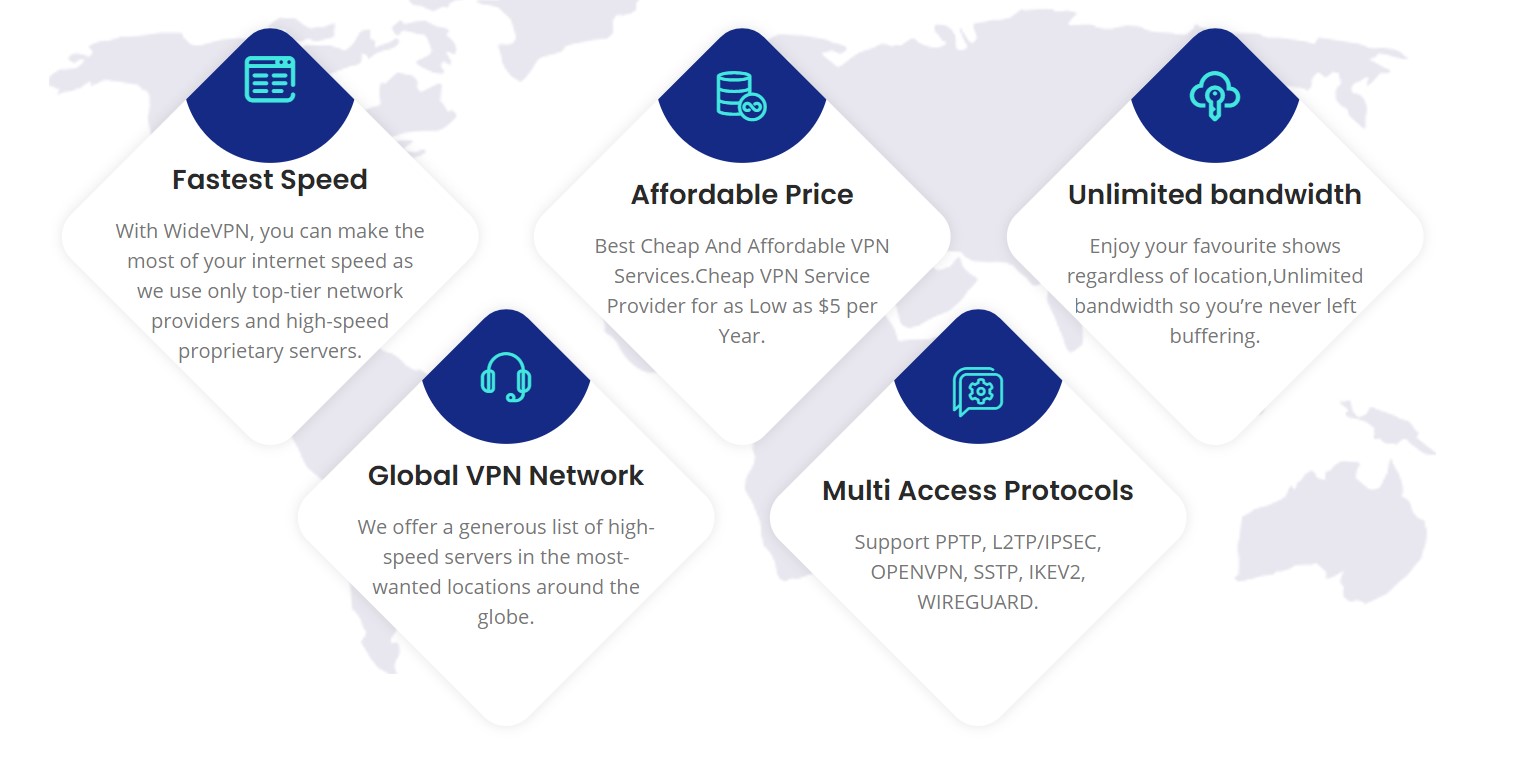TechRadar Verdict
WideVPN deploys the innovative WireGuard protocol, provides access to popular streaming channels and is also rather cheap. However, its download speeds are far from fast and the absence of native clients may also put off VPN beginners.
Pros
- +
Unexpectedly cheap
- +
Access to Netflix and BBC iPlayer
- +
WireGuard support
- +
Accepts cryptocurrencies
Cons
- -
A bit slow
- -
No native apps
- -
Really short money-back guarantee
Why you can trust TechRadar
WideVPN is a vendor of VPN services that ticks all the usual boxes: it protects your privacy online, gives you access to all sorts of content unavailable in your region, and lets you share large files via torrenting clients. If only the speeds were better, WideVPN could be truly great.
Price
If you want to purchase WideVPN’s services, you can take your pick from three options, differing in their lengths and the number of supported simultaneous VPN connections.
The shortest option is the 1-month plan at $4.99/month, which supports a maximum of 2 simultaneous VPN connections. It is followed by the 1-year plan at $9.99 ($0.83/month) and support for up to 7 simultaneous VPN connections. The longest subscription lasts for 2 years and will cost you $15.99 ($0.67/month) - and also supports up to 7 simultaneous connections.
We were pleasantly surprised by these rates, which place the provider among the cheapest VPN solutions we've had a chance to test.
You can pay using credit/debit cards, PayPal, Alipay, various cryptocurrencies, and over 200 other payment methods. There’s no free trial, but you can use the 3-day refund guarantee to get your money back in case you’re not entirely happy with your purchase.

Alternatives
WideVPN shares some of the qualities possessed by today’s biggest names in the VPN industry. It unblocks major geo-limited streaming platforms just like ExpressVPN does, deploys WireGuard like NordVPN, accepts payments made in cryptocurrencies like CyberGhost .
However, it also fails to tick a few key boxes. Unlike WideVPN, all of the above platforms have gorgeous and intuitive native clients, offer generous money-back guarantees and provide blazing speeds that enable you to watch even the most graphically-demanding and bandwidth-consuming video content.
Streaming
If you’re a streaming fan, we have some good news for you: WideVPN can definitely unblock geo-restricted content provided by the likes of BBC iPlayer and Netflix. Do note, however, that speeds may not always sufficient to stream in HD, so you should experiment a bit with the servers to try and find one that works best.
About the company
The company running WideVPN is called Amplusnet SRL and is located in Romania. It provides access to over 40 servers in 32 countries, including Mexico, Chile, Vietnam, Egypt, UAE, Malaysia, and others.
Privacy and encryption
WideVPN works through OpenVPN and the innovative and increasingly popular WireGuard protocol. We tried to find out what encryption is used but couldn’t get a straight answer. In our experience, it is either the 256-bit or 128-bit algorithm.
The vendor’s Privacy Policy is an unexpectedly short document, which states that it doesn’t log IP addresses, DNS requests, traffic, user bandwidth and data transfer, or any user activity. It also adds that it doesn’t “log or monitor any user activity on our VPN. Everything you do whilst connected to our VPN is anonymous and not logged or viewed by us”.
That’s good to know and better than many other VPN’s no-logging policies, but since there hasn’t been any external confirmation yet, your only choice is to trust these claims.
WideVPN allows the use of its platform with P2P and torrenting apps, but only through servers that are marked as P2P-supported.

Support
WideVPN doesn’t have its own native clients but it can be installed with the help of third-party software (OpenVPN Connect, AnyConnect, TunnelBlick, WireGuard app, etc.) or a device's built-in VPN and configuration files you can download from the client area of the website.
This approach does require a bit more work and is slightly more complicated than just downloading an app, so it might not be the best for a beginner. There are, however, detailed and meticulous instructions on how to do this, so you may not have any problems, after all.
Supported platforms include Windows, Android, Mac, iOS, Linux, WebOS, Blackberry, and routers.
Help is available in the provider’s Knowledgebase, which is divided into two categories: Setup Guides and Frequently Asked Questions. If you’d rather have a customer support agent talk to you directly, you can reach out via a contact form, email, or send a message on WhatsApp.
Speed and experience
As mentioned above, considering that there are no native clients, the task of installing and running this VPN may be too time-consuming and complex for a beginner in the industry, but the learning curve isn’t steep thanks to the really detailed installation guides on the website.
Our speed tests began with a server located in The Netherlands, which gave us a rather slow (but usable) 9.31Mbps on a 76Mbps testing connection. Then we gave the UK server a shot and it delivered 7.75Mbps.
Crossing the ocean and visiting a server in the US (California) hailed a low 3.81Mbps, while a server on the opposite side of the world, in Thailand, got us a measly 0.67Mbps.
Verdict
WideVPN hasn’t gathered much attention so far but has a promising platform that will probably achieve more success and possibly stand side-by-side with the industry giants if it fixes some of its problem areas.
The main issues are its below-average speeds and a short money-back guarantee. If it wants to appeal to VPN beginners, the firm should also consider introducing user-friendly native apps. Otherwise, it has quite a few advantages: possibly the lowest prices we’ve seen so far, access to popular geo-restricted video content, cryptocurrency support, and the use of innovative VPN technologies.
Sead is a seasoned freelance journalist based in Sarajevo, Bosnia and Herzegovina. He writes about IT (cloud, IoT, 5G, VPN) and cybersecurity (ransomware, data breaches, laws and regulations). In his career, spanning more than a decade, he’s written for numerous media outlets, including Al Jazeera Balkans. He’s also held several modules on content writing for Represent Communications.
